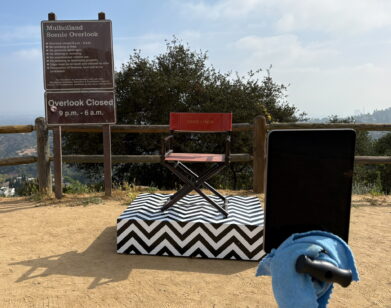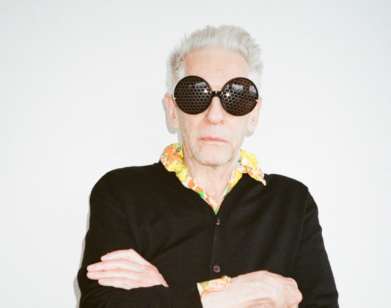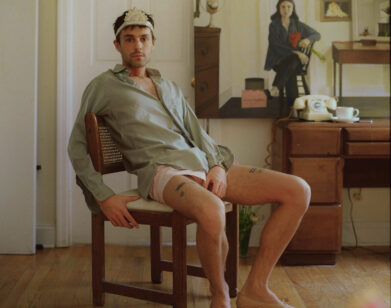IN CONVERSATION
Kristoffer Borgli and Kate Berlant Are Embarrassed to Be Alive
The main character of writer-director Kristoffer Borgli’s film Sick of Myself is, in essence, a heightened and more monstrous version of the sort of people the comedian Kate Berlant likes to satirize. Signe, a monomaniacal and disaffected twenty-something working at a coffee shop in Oslo, where she lives with her boastful furniture designer boyfriend, wants to be seen, but she has neither a talent nor a trauma to exploit, and therefore no real capital in the attention economy that reigns supreme in 2023. But a chance encounter at her workplace, in which she kind of saves a customer bleeding out from a vicious dog bite, accords her an exciting but short-lived viral fame. So she tries to do one better, soliciting from a drug dealer friend an off-brand Xanax associated with a virulent skin disease that causes her to break out in increasingly severe lumps and rashes, making her visible—at last—to the world. Here, Borgli’s witty send-up of modern malaise becomes a full-blown fantasia of ego and body horror; the worse Signe’s condition gets, the more renown she receives, but no one knows it’s been madly and precisely engineered.
In her most recent stand-up show, Kate, Berlant performs a similar if less nauseating autopsy on the modern condition, playing an aspiring actor who, like Signe, feels she must find and make use of a formative wound in order to reach her potential. It’s no wonder, then, that Berlant was so drawn to Borgli’s film. “There’s just something fundamentally embarrassing about being alive right now,” she told the director as they sat down for lunch after their semi-regular tennis lesson in Los Angeles. “She never wonders whether this will get her attention. She knows that it will.” Below, Borgli and Berlant discuss our modern obsession with individuality, the follies of moralistic art, and the work of Woody Allen, David Lynch, Karl Ove Knausgård, and Jonathan Glazer.
———
KATE BERLANT: We’re on the record now. I’m Kate Berlant, sitting here with Kris Borgli. We just had a tennis lesson together and then we had some lunch. So, you were just saying that you’re kind of enjoying having a little time off for the first time in a while.
KRISTOFFER BORGLI: Yeah, it’s been back to back since making Sick of Myself and then straight into a new movie, my first American movie. And now I’m finally done. I locked the edit. I can go and have a tennis lesson and lunch on a Monday, and it feels great.
BERLANT: Yeah, you’re quite prolific, you’re self-motivated, clearly.
BORGLI: It’s become not an obsession, but almost intrusive thoughts or something. This feeling of if you’re not working you’re fucking up.
BERLANT: Of course. It’s so American of you. And you’re not even American.
BORGLI: I know.
BERLANT: It’s already rubbed off.
BORGLI: Not very Norwegian of me, but I guess it’s coming from this thing that we do, where it always feels like you’re just three steps away from not having a career anymore. Because also writing a movie or anything creative, there’s no one who’s expecting that from you. There’s no one telling you to do it, so you have to become your own manager or whatever. Jerry Seinfeld, he used to talk about “morning guy” and “night guy.”
BERLANT: Ooh, I’ve never heard that.
BORGLI: He has this routine about how morning guy hates night guy, and night guy hates morning guy, and night guy doesn’t think about consequence, doesn’t have any empathy for the morning guy. So he’ll go out late and stay up and basically fuck up morning guy’s life. So I think my morning guy is the dominant version of me and I’m afraid of the power of the night guy, what he can do to me. He can ruin anyone’s life.
BERLANT: Well, today you’re having a very morning guy life. 10:00am tennis. And that fear-based productivity, it’s making me think of social contagion, one might say, and trying to draw parallels instantly to Sick of Myself, the capital of always working, and then also the maybe distinctly American capital of one’s individual self and, particularly now, one’s individual trauma or special suffering or pain to that can only be felt if it’s witnessed and turns you into a star.
BORGLI: And it comes from whatever socioeconomic background or inherited struggle, or just a very strong narrative of trauma that we as a society have equated to authenticity, that to have a strong struggle is authentic, to have experienced both the good and bad of life. And I think for a Norwegian person who comes from a somewhat affluent background, there’s the fear of being inauthentic, of not having a trauma or a story or a struggle or a narrative. And so you’re kind of less interesting and we don’t really want to hear from you. And I think that is one of the key motivators for Signe, the lead in Sick of Myself, to start this really dumb project of hers, which is I guess why it’s works as a satire.
BERLANT: She never wonders whether this will get her attention. She knows that it will. I love the competition we see in the couple. As one kind of starts to gain this niche following, it starts to threaten their relationship, but also her own selfhood and thinking. If I want to get really heady here, I’m like, “Okay, well, the skin is the border of the self. The skin separates yourself from someone else, yourself, from your culture, your immediate surroundings.” And her desire for personhood or some story or narrative, it has to be expressed on her skin. It’s almost like her rash, it’s her ritual tattoo or something.
BORGLI: Or identity, definitely.
BERLANT: Yeah, that kind of very human need to be marked in some way and to have people recognize you through the markings on your skin.
BORGLI: Yeah. I think when you write a script, it’s the first draft. The second draft is when you make it feel like the story had a meaning all along. In the beginning, you’re just kind of pushing things you find interesting around. So the idea of skin disease being a way to make the ailments visible and cinematic, it’s in retrospect really smart but I didn’t think of it that way. I was interested in the looks of abnormalities of skin disease, of prosthetics, of body horror. And it’s after releasing the movie, I’m almost thinking about all the philosophical layers and what it means.
BERLANT: Yeah. It’s initiation into selfhood or something that couldn’t be attained otherwise. Obviously I wasn’t going to bring my own work into this, but I’m in comedy and the trope of the stand up comedian is having some kind of pain, some wound to show. And I’m like, “Yeah, I grew up upper middle class on the west side of L.A. There’s no capital T traumas that I can exploit.”
BORGLI: And I saw your show at The Elysian. And you had a bit about—
BERLANT: Well, it’s about an actress who—
BORGLI: What’s it, like, lactose intolerance?
BERLANT: Yeah. She’s iron-deficient. She’s trying to locate any kind of trauma that she can exploit, because if she doesn’t have pain or pain that can be seen and talked about, then why the fuck is she on stage? Which is a very real thing in the culture of, “What we want out of a story is to see someone undergo some kind of spiritual transformation where they’re pulled out of the trauma of childhood or their culture or their society.” And what’s so funny about your movie, too, is that it doesn’t wrap up neatly, the narrative doesn’t follow those clean lines that are so kind of ham-fisted and common in the culture.
BORGLI: You mean wrapping it up in a moral?
BERLANT: Yes. There is a moment at the end where she’s like, “Oh my god.” I think I told you this before, imagining the bad version of your movie, what would it be?
BORGLI: “I realized all along, I just hate myself and I need to love myself more.” I don’t know.
BERLANT: Or even worse, it’d be her encountering somebody who has a real deformity and then she’s like, “Oh, my god, I’ve robbed you, and you have the real pain and I don’t.” And it would be her opening a girl’s school.
BORGLI: Oh, yeah. Learning from the mistakes and becoming a better person.
BERLANT: Yeah. So I think it’s very funny. There’s just something fundamentally embarrassing about being alive right now for a million reasons, one of them is this continued call to… “Well, what’s the story and how do we make it? What is the entry point?” And usually that entry point is supposed to be pain or trauma or something that endears us to someone. And you don’t give us a reason to endear ourselves to her. The thing that’s very relatable, which is the fear of your partner or someone getting tired of you and outgrowing you, or suddenly they get affection from the external world and they don’t need your affection anymore, these are very common fears, and they make us do ugly things or make us fantasize. In your movie, I loved the fantasy of the funeral. I have found myself doing that. We’ve all had those dreams or hopes of collapsing, dying in the arms of someone in that moment.
BORGLI: My whole family’s in that scene attending the funeral.
BERLANT: Oh my god.
BORGLI: Because it was a limited budget, we needed people to show up with a black suit and tie. Everyone in that funeral thought that it was going to be a sad scene, and then they got to see the movie and how it’s part of a sex fantasy.
BERLANT: A friend being turned away was one of the funniest things in the world. The list, the nightclub. It’s such a great joke. It’s so satisfying to watch.
BORGLI: Thank you.
BERLANT: How long was the shoot?
BORGLI: It was a 30 day shoot on 35 millimeter, which I thought was going to be impossible, but somehow we made it happen. One of the negotiation things I had to give in on was editing the movie myself, which is the first movie I’ve edited. It was the only way we could cover the cost of the shoot.
BERLANT: Unbelievable. Wow. So you had never—
BORGLI: I’ve been editing shorts and stuff, but I’ve never dealt with editing a feature film before. And I just did it on my laptop in my apartment.
BERLANT: I love this. We all need to hear this.
BORGLI: I didn’t know that you’re supposed to cut a feature film into reels. So it stems from the old way of actually shooting on film and editing on film.
BERLANT: Scissors and glue?
BORGLI: A film reel is 20 minutes. When you see a movie in the theater, they switch the reels. They talk about this in Fight Club, they explain it, but every 20 minutes they have to switch to reel and they have to do it seamlessly so the movie seems like it keeps going.
BERLANT: So cool. So you’ve talked about this movie and how it starts as this kind of Annie Hall-esque slapstick comedy, and this kind of horror in a certain way. But it’s very much in a different aesthetic language.
BORGLI: What I wanted was to deal with somewhat shocking imagery and a skin disease and someone being mentally messed up enough to do something like that. But I also wanted the audience to be kind of shocked. So I felt like, what if we started this movie as more of a romantic comedy? And I love Woody Allen movies, and what if I could just for 20 minutes pretend it’s that type of movie and the body of horror elements will suddenly appear out of the blue. It doesn’t fit in the genre at all. It feels like a little mental whiplash of, “Wait, the contract that we signed at the beginning of this is a romantic comedy, and now it’s something else.”
BERLANT: And it’s so funny, in the beginning it’s like, “Oh, it’s a romantic comedy, they’re at a party making out.” And then it’s so funny and so shocking to see that you’re really going for it and you really have turned her into this monster. You pushed it to the limit and then it continues to push. She’s going to be seizing on the ground, her arm twisted behind her, and there’s going to be blood and vomit and all of this abject material of the body, and you can only go to those limits if you’re grounded in a very familiar reality.
BORGLI: Yeah, exactly. And you’ve talked about this before, but writing a character that’s supposed to be funny is the most impossible thing.
BERLANT: Hell.
BORGLI: A character cracking jokes will never be as funny as a character who has no self-awareness and fucks up.
BERLANT: If you watch a show or a movie and there’s a funny guy who we love and he’s making us laugh, it’s like, “Get him out of here.” I’ve always felt that as an actor. A couple times things have come to me where the role is playing a funny gal. And it’s like, “Not only could I never possibly even know how to play that.” It’s like, “This is not why anything should ever exist.” We don’t go to movies to watch someone be chill. People still make things like that, but they’re not good. I was talking with a friend the other day about what would’ve happened if there was somebody who was funny to everyone. Imagine if there was a comedian or someone that just made the whole world laugh. And it’s like, would civilization just collapse? If there was one person that was just universally adored across all cultures and no matter what they did, people would just be dying laughing.
BORGLI: But isn’t that the idea of vanilla? Vanilla is the thing that everyone likes.
BERLANT: Right.
BORGLI: Woody Allen tries to have characters that crack jokes. And he has these one liners that he throws out. But him being funny is when he’s a nervous wreck and fucks up a situation.
BERLANT: It’s like his standup is in the movie.
BORGLI: And Woody Allen is not funny when he is trying, but he is, of course, as a writer, trying to be funny when he’s fumbling in a social situation. That’s comedy too, but that’s not making the audience laugh at what a brilliant, confident comedian is.
BERLANT: It’s endlessly interesting. We can’t see ourselves. We can never see ourselves. So if you have a character, and you’re trying to portray them as almost having no blind spot, and they’re accessible to themselves, they’re being funny. We’re watching them and we’re going, “Oh my god, look at them go,” there’s nothing to hold onto. It’s just vapor. It doesn’t stick to anything. And there’s no point. And it kind of shows in the filmmaker or the writer a fundamental incuriosity. I have such disdain for it, clearly.
BORGLI: I’m so grateful for say, Karl Ove Knausgård, the Norwegian writer, the six-book series, he puts his worst sides on the page in great detail.
BERLANT: Still haven’t tackled it. But yeah.
BORGLI: Highly recommend. But some people critique his books thinking that he’s condoning the behavior by writing the behavior. And it’s like, no, he’s so generous and self aware after the fact that he now is sitting 10 years after having done this horrific thing that he writes about. He’s putting it in a book. He knows that it’s horrific and that’s why he is writing it. And he’s being very generous and honest, and letting us learn from someone else’s mistakes.
BERLANT: And also assuming your audience doesn’t need that, this kind of modern disease of the morality play. And it’s like, who goes to a movie in order to see how they should be living? It’s not Sunday school and it shouldn’t be.
BORGLI: Yeah, it’s not a device to raise your kids.
BERLANT: And it’s almost like I don’t buy it, that critique. “Oh, you’re condoning that behavior through writing that character.” It’s almost like, you don’t actually believe that. It feels like they’re shit-stirring. Who actually thinks that? Maybe some people, I don’t know.
BORGLI: This author, a psychologist, Paul Bloom, has said, “It’s easier to learn psychology through fiction if it’s books or movies.” If you want to know what it feels like to go through a divorce or something, it’s really hard to understand it. But seeing someone just honestly depicting the horrible behavior and the feelings that we go through, and fiction being a device that should expose us to the negative dark traits that we have… The things that make us difficult should be displayed in fiction.
BERLANT: Yes.
BORGLI: I’m not saying that the utility of the [character] arc is this catharsis, but it could have that. I saw it so I don’t have to live it. Or, I saw that mistake being made, so I’m a little bit more self-aware when that feeling pops up in my head.
BERLANT: And it creates empathy, what you’re saying.
BORGLI: Yeah.
BERLANT: And where we get into trouble is when we put things neatly in categories of good and evil. I mean, that’s bullshit, man. We’re all capable of horrific acts. We’re all capable of godly moral acts. And that’s what’s so scary.
BORGLI: And when fiction and movies show us easily finding the happy ending, this fake expectation of romantic comedies where things just work out in the end, then you live a life where that story never feels like what you’re living. And it makes it even harder to cope with life because of this kind of fake expectation through bad art.
BERLANT: Yeah. Oh my god, it creates so much suffering.
BORGLI: There’s a nice feeling of a happy ending that maybe we appreciate as humans, but we should maybe learn how to get a better acquired taste. Sugar feels really good, but it’s ultimately bad for us. These bad fiction stories with neat, perfect endings and everything, it feels good in the moment, but it’s actually bad for us. It sets us up with wrong expectations. And then it’s almost a disservice to open a healthy food restaurant because people don’t really want it. But we’re actually trying to do someone a service. And I am so grateful for art and literature and fiction that I’ve been exposed to that really have challenged the neat formula of fiction and given me something that’s a little bit harder to swallow, but has also given me something—
BERLANT: Nutritious or valuable.
BORGLI: Nutritious or valuable for my life. And I want to pay it forward with my own art, too. I want to have this responsibility to be honest.
BERLANT: Well, yeah, there is a responsibility and most people have failed tremendously and the culture doesn’t really provide much encouragement to go that route. I think there’s this feeling right now with TV and movies where people don’t want to see the ugly thing or even talk about it. And you could say, “Oh, it’s the last two years, it’s kind of the horror of being alive right now.” But it’s like, “Don’t we want more? Shouldn’t we demand more? And shouldn’t we actually kind of strive to consume things that are a little harder to digest or that actually challenge us or challenge the limits of what we think is palatable?” We have a responsibility, don’t we, to ourselves and to each other, to just not gorge ourselves on shit all day?
BORGLI: That’s what David Lynch did to me. And I think that’s a great utility of art. And it’s a risky thing because we rate our experience based on how much it fed into my expectations of what I’m going to get out of a movie. And a David Lynch movie gives you none of that. It gives you something different, and it’s work, but it’s rewarding.
BERLANT: Or you think about Jonathan Glazer and Birth. It’s one of my favorite movies. And I remember when I saw that, it changed my life. And so the reward of Birth or something, it’s wrestling with these much deeper subconscious realities of reincarnation or grief and sex and impossible relationships. But I know people where it’s just like, “Oh, it’s too weird for me. It’s too dark.” And I’m not trying to stand here and be like, “Oh, my tastes are so highfalutin. I can only consume challenging [work]. I’m not into comfort cinema.” Of course not. But movies are without question going away. They’re becoming harder to be made, right? So it feels kind of a miracle when I’m like, “Well, thank god.” There are people that are still being given these resources—
BERLANT: To make a movie! And that’s really hard. I mean, making a funny movie now, those are almost gone. Because isn’t a comedy film no longer seen as something that should have theatrical release? A comedy is kind of seen now as being this kind of excess that can be taken away because now the theatrical experience is reserved for horror action.
BORGLI: I did have a meeting with a producer and I got sent over a list of genres and the percentage of audience and comedy was not high up there. It was a horror, of course, horror and action are apparently the things. So I feel like we need to make a horror-action-comedy to sneak into the mainstream again.
BERLANT: Absolutely. I know. Great.
BORGLI: So that’s what we’ll do. Let’s figure it out.
BERLANT: Great. I’m avail. And maybe we’ll do tennis again next week.
BORGLI: This was an honor.
BERLANT: It’s a pleasure. I wouldn’t do it if I weren’t a fan.
BORGLI: Thank you so much.







